#keith doom and the wrecking crew
Explore tagged Tumblr posts
Text
SUMMARY
The film opens as Rose is found drifting alone in a small rowboat. Two fishermen find it and pull her onto their own boat, barely alive and in a horrible state. Her voiceover indicates she had been rescued from some terrifying experience and the film’s events are flashbacks of it.
Rose is part of a group of tourists on a small commercial boat. The Captain and his mate, Keith, share a fondness for Rose. Also on board are Dobbs, who is the boat’s cook; Chuck, another tourist; and a bickering married couple named Norman and Beverly. After trouble with the engine, the navigation system goes haywire when they encounter a strange orange haze. The others sense that something is wrong. Norman in particular becomes abrasive. In the darkness of night, a hulking ship suddenly appears and sideswipes their boat. The Captain sends up a flare, which momentarily lights up the eerie sight of a huge, rotting vessel wrecked nearby.
The next morning, everyone wakes to find the Captain missing. Realizing the boat is slowly taking on water, everyone evacuates in the lifeboat and makes for a nearby island. They see the huge wreck in the light of day; it appears to have been there for decades, nothing more than a skeletal framework, and now seemingly immobile, stranded on the island’s reef. The group is startled to find the body of the Captain, apparently drowned while he was trying to check the underside of the boat for damage. They explore the island and discover a large, rundown hotel. At first they think it is deserted, but they discover a reclusive old man living there.
The man seems alarmed by their story, and he goes down to the beach to personally investigate. Under the water, strange zombie-like men gather, walking from the wreck along the ocean floor to the island. As Dobbs gathers items to help prepare food, the zombies corner him in the water and one of them attacks; before it kills him, Dobbs falls in a cluster of sea urchins and is horribly mangled. Rose discovers his body while swimming. Back inside the hotel, their reluctant host tells them that he was a Nazi commander in charge of the “Death Corps”, a group of aquatic zombies. The creatures were intended to be a powerful weapon for the Nazis, but they proved too difficult to control. When Germany lost the war, he sunk their ship. Knowing the zombies have returned, he says they are doomed. The Commander goes down to the beach again and sees a few of the zombies off in the distance; they refuse to obey and drown him.
The others locate a boat that the Commander told them about and pilot it out through the streams to the open water. They lose control of the boat, and it sails away from them, empty. A zombie drowns Norman in a stream, and another chases Rose back to the hotel, where she kills it by pulling off its goggles. Chuck, Beverly, and Keith return to the hotel, and they barricade themselves in the refrigerator unit. The close quarters and stress cause the survivors to begin infighting, and Chuck accidentally fires a flare gun, blinding Beverly. Keith and Rose escape to an old furnace room, where they hide inside two metal grates, while Beverly hides in a closet. The zombies drown Chuck in a swimming pool outside.
The next morning, Keith and Rose discover Beverly dead, drowned in a large fish tank. Now on their own, they try to escape in a small sightseeing rowboat with a glass bottom. The zombies attack, and although Keith manages to defeat one by pulling off its goggles, a second one grabs him and drowns him just as the dinghy breaches the reef and drifts free. Rose sees Keith’s lifeless body pressed up against the glass bottom of the boat and screams.
The film comes full circle, and Rose’s voice over returns. She is now in a hospital bed, seemingly writing in a journal. Her dialogue begins to repeat itself over and over, and she is revealed to be writing nonsense in her journal, showing that she has gone insane.
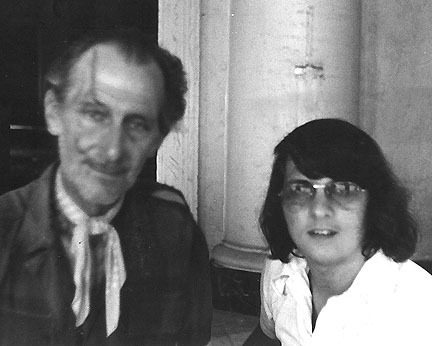
Peter Cushing & Fred Olen Ray
BEHIND THE SCENES
Wiederhorn didn’t have much budget to work with on Shock Waves, but still managed to find intriguing, inexpensive ways to complete his first feature film, shooting everything in 35 days in 1975 although it wasn’t theatrically released until 1977. He was limited in how he could use Cushing and Carradine, whose contracts only accounted for four shooting days (both actors earned just $5000 each). He was able to secure a permit to film on the SS Sapona — a concrete-hulled cargo steamer which ran aground during a hurricane near Bimini in 1926 — and the Biltmore Hotel in Coral Gables, Florida, was rented for $250 per day, which was abandoned at the time.
Wiederhorn employed two cinematographers — Reuben Trane above the water, and Irving Pare below — who shot on 16mm (which was then blown up to 35mm for theatrical prints, accounting for the film’s grainy look).

KEN WIEDERHORN INTERVIEW
I want to ask you first, does the idea of talking about SHOCK WAVES and revisiting this title excite you still? How do you feel today about the film’s legacy and your role in horror history?
KEN WIEDERHORN: I love the film because it’s the movie that keeps on giving
Do you mean that in a financial sense or otherwise?
WIEDERHORN: In the financial sense. When you make your first film, little do you know that it’s going to follow you around for the rest of your life and keep putting money in your pocket so that’s always a very nice feeling. I’m delighted when anything happens with SHOCK WAVES
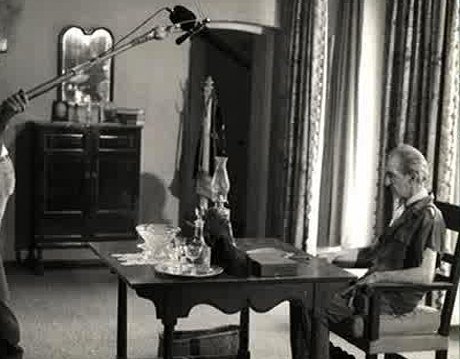
Were you born and raised in Florida?
WIEDERHORN: No I’m from New York.
Ok, so how does a New Yorker end up in Florida with Peter Cushing and John Carradine?
WIEDERHORN: I was working as an assistant film editor for a documentarian who had also made some feature films and somehow he wound up being appointed the head of the film program at Columbia and he said well if you’re interested in taking some more courses let’s talk about it. I’m pretty sure I can get you into the film program’. He in fact did that. So I have an MFA with no undergraduate degree. Anyway, there I met Reuben Trane who is from Florida who was also in the films program and we partnered on our thesis film which was called MANHATTAN MELODY and that won the first Motion Picture Academy Student Film Award. Then Reuben decided that he wanted try his hand at producing a low budget film and raised some money. The investors said basically we’re fine with this as long as you guys make a horror movie because we heard that horror movies always make their money back so that’s how that happened. He raised a couple hundred thousand dollars and I drove down to Florida and we figured out how to do it there
Why a zombie movie? Or did you even think of the Nazi ghouls as zombies when you were coming up with this idea?
WIEDERHORN: I was not necessarily a horror aficionado. I really worked in the cutting room and was coming up that way. I was still very much thinking that I was going to become a producer at CBS news so I can’t say that I came to it with a great deal of interest or expertise in the horror genre. I simply went looking for material. I found a book called The Morning of the Magicians which purports to tell about the Nazi belief in the supernatural and in reading that book somehow I thought, ok this makes sense. We knew we were going to shoot the film in Florida. Reuben knew his way around boats, we were going to be in Miami so the water element came in and I suddenly had a vision of Nazis attacking Miami Beach which could be quite humorous. See, the thing for me about horror is that it always walks the line with comedy so you have to be very careful to make sure you’re on one side of that or the other so I thought, no, we can’t go in that direction. That led me to thinking about soldiers underwater and one thing led to another and with the help of a few joints we came up with the idea of underwater Nazi zombies!
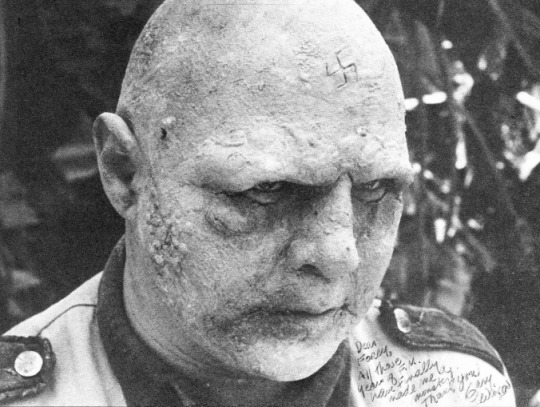
Even if you haven’t seen SHOCK WAVES, you know the art and you know those creatures which have been riffed on several times in several films but there’s a look to them. Alan Ormsby did the makeup FX and the Nazis remind me of his work on Bob Clark’s DEATHDREAM, Did you give Ormsby much guidance when it came to creating these creatures?
WIEDERHORN: I hadn’t seen DEATHDREAM and I still haven’t seen it so I had nothing to relate to in Ormsby’s background. I know he had worked on a movie called CHILDREN SHOULDN’T PLAY WITH DEAD THINGS. Listen, when you’re in Miami, you don’t have a lot of choices in terms of crew and people to help you imagine the film so I was delighted to meet Alan because I felt we were very like-minded. He thought the film would be very problematic because one requirement was that the makeup had to withstand exposure to water. We didn’t want to get bogged down with it washing off and having to re-apply it eight times a day so he very brilliantly came up with a solution for that and it was amazing how that makeup withstood the constant submersions those guys had to make. Now as far as the details of the makeup, I know that we already decided that we wanted to make their vulnerability be exposure to light so hence the goggles and we wanted to make sure they were blonde and that came about primarily because we got a deal with a Cuban beauty school in Miami to take the guys and strip the colour out of the hair with bleach and that was affordable and doable and that’s what defined that. But Alan certainly, I would say was ninety percent responsible for the look of the zombies.
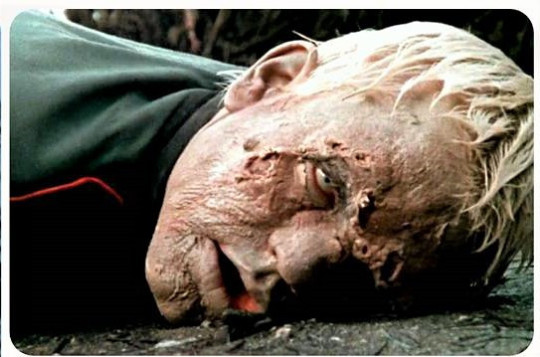
Obviously people that love SHOCK WAVES always cite the heavy dense atmosphere that the movie trades in. Talk about that eerie ruined boat. Did you find the boat first and make the movie around it?
WIEDERHORN: The wreck is off one of the Bahamian islands so we could get there easily enough from Miami. Somebody had a chart of wrecks in the south Florida area that was more oriented towards treasure hunting and somehow this wreck was marked on the map and we investigated it and discovered it was an old World War II cement ship. The hull of the ship was actually made from cement. We saw pictures of it and we thought ok that will do and that was that.
Did the script reflect that they would run into some sort of ruin or did the ruin end up being written into the script because of the existing wreck?
WIEDERHORN: No, the script was always scripted that way.
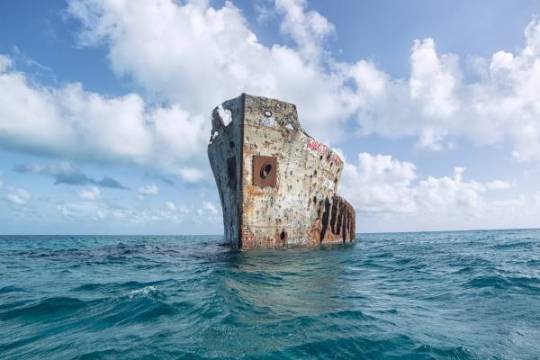
Is the boat still there do you know?
WIEDERHORN: As far as I know.
Amazing. The other key element of the film is Richard Einhorn’s minimalist music. Was Richard your choice or was be brought to you?
WIEDERHORN: Richard was also at Columbia and he was studying with a professor whose specialty was electronic music. So I went to the department head and said I’m looking for somebody who can do electronics for a horror movie score and Richard was one of the people who they recommended and we sat down and talked. I thought he would do a terrific job and I think he did. I think that the movie owes much to its music.
It sure does and you used Richard again for “EYES OF A STRANGER as well didn’t you?
WIEDERHORN: Yep and then used him again for the last film I made called A HOUSE IN THE HILLS
He went on to quite an illustrious career as a composer…
WIEDERHORN: He’s more of a serious classical modern composer and he’s done all orchestral score for JOAN OF ARC and he’s very active in New York. Richard was always my first choice for anything I was doing.
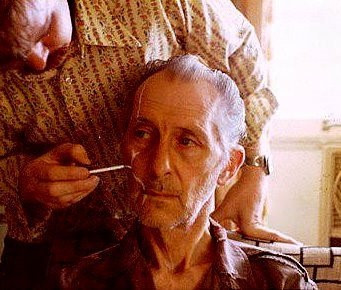
Now we’ve got to talk about Peter Cushing. This is, I think, one of his last notable horror roles…
WIEDERHORN: Ah yes, Peter. The horror movies that I actually knew were Hammer films. Why that is, I don’t know but I knew quite a number of the Hammer films and what appealed to me about them was that they really relied on story to some degree. But even more importantly, atmosphere and quality of acting. They were well produced and they were able to work on that level. So I very much had that in mind. We knew going on that we did not want to get into a lot of bloody special FX because we were making a low budget movie and it seemed to me that the way to succeed was not to become overly ambitious. To really make sure that what we were doing was something that we could in fact do. So the element that cost the least is all the elements of building suspense. I look at the film today and parts of it seem terribly slow to me but I understand and I see how at the time it worked in its way. It certainly worked because what I hear from people telling me about their experience of seeing the movie when they were 13 years old on late night TV is that when you’re channel surfing, this film stands out because it looks different. I personally really hated the locations because they were really difficult to work in terms of physical comfort. It was hot, it was humid and we would have to cover ourselves with mosquito repellent several times a day. There were sharks swimming in the water that we were working in Biscayne Bay so I think that worked for the film. I wasn’t the only one having a difficult time with the physical element that we were working it.
But back to Cushing, his nickname while making the Hammer films was “Props” Cushing because he would always find a way to work the surrounding props into his performance. Did you see any evidence of that in his work? Was he resourceful that way?
WIEDERHORN: The only prop I think he had was a cigarette holder that he used. He gave me a preview of the accent and I thought well it’s not really a German accent but it’s an accent so it’s fine. The great thing about Cushing was that he was very giving and very professional and even though he probably saw a lot of us walking into walls during the day, he was helpful and extended himself in ways that I certainly didn’t expect. In fact one day I was trying to figure out how to set up a shot on a beach somewhere and he was always available and he was always nearby, it’s not like between takes he went off and sat in his trailer, he was very available. So he’s watching me having a problem figuring things out and he gets my attention and motions me over and he says “Dear boy may I make a suggestion?” and I said “Sure Peter, what?” he says “I think if you move the camera a little bit off to the right and you lower the frame a bit you’ll get what you’re looking for and damn, he was right! I realized this is a guy who’s had more set experience than most of the directors he’s probably worked with and I knew that he was observant to what was going on. He was watching and so whenever we were ready, he was always ready. Whereas Carradine who came from a different discipline entirely and probably had been in four times as many movies as Cushing was in, he didn’t want to know about anything except what’s my line, where do I stand and when can I get the hell out of here.

Peter’s wife passed in 1970 and apparently those who worked with him around this period said he almost had a death wish. He always talked about her in a very morbid way. Was he a melancholy guy did you notice? Was that evident at all?
WIEDERHORN: I would say no. I do know about the wife but all I can tell you is that he was very open and frank about the fact that he would communicate with her through various mediums.
Have you seen any evidence of SHOCK WAVE’s influence in any other films or pop art?
WIEDERHORN: Well, people have pointed out to me that there is a whole collection of Nazi zombie movies now and I really have no idea if SHOCK WAVES had anything to do with that or not, that’s for other people to figure out. Other than that. I know it happens that there are references made to it. Somebody sent me a mystery show where SHOCK WAVES was a central part of the plot…
What about a remake? Since everything even borderline cult has been remade or is in the process of being remade, there must be somebody knocking on your door to try and do a remake of SHOCK WAVES…
WIEDERHORN: Yeah, I get that knock on the door a couple of times a year but frankly it’s usually ‘let us take an option and give us two years and we’ll see if we can get something done and I’ve been around that track many times and I figure if somebody is really serious about remaking it or doing a sequel in some way it will either happen or not. I don’t really have any interest in doing it myself.
This slideshow requires JavaScript.
Promotional and Advertising Material/Lobby Cards
SOUNDTRACK/SCORE
Richard Einhorn’s haunting experimental, analog-synth score — one of the earliest electronic compositions created for film — is often singled out for its creative use.
SHOCK WAVES LP (Waxwork Records) Original Richard Einhorn Score
youtube
CREDITS
Cast
Peter Cushing as SS Commander
Brooke Adams as Rose
John Carradine as Captain Ben Morris
Fred Buch as Chuck
Jack Davidson as Norman
Luke Halpin as Keith
J. Sidney as Beverly
Don Stout as Dobbs
Directed by Ken Wiederhorn
Produced by Reuben Trane
Written by
Ken Wiederhorn John Kent Harrison
REFERENCES and SOURCES
Delirium Issue 005
Shock Waves (1977) Retrospective SUMMARY The film opens as Rose is found drifting alone in a small rowboat. Two fishermen find it and pull her onto their own boat, barely alive and in a horrible state.
0 notes
Text
Keith Doom and the Wrecking Crew : Malt Water Party : Goth Kids
Keith Doom and the Wrecking Crew : Malt Water Party : Goth Kids
View On WordPress
0 notes
Text
The Future Is Now | An Interview With Zilla Rocca

Philadelphia is rich with hip-hop history going back to Spoonie-G, DJ Jazzy Jeff & The Fresh Prince, The Square Roots (The Roots) on through Freeway, Beanie Sigel, Dice Raw, Lushlife and of course the Wrecking Crew’s own double threat Zilla Rocca. With more than 15+ years deep in the game Rocca is approaching the release of his latest and in this writer's humble opinion most impressive album yet via legendary music journalist Jeff Weiss’s POW Recordings with, Future Former Rapper set to drop in the coming months.
I reached out to the Wrecking Crew, Career Crook, Grift Company Producer/Lyricist to talk about his career, parenthood, how his approach has changed and all sorts of shit in between. Over the course of the conversation I digested the new album and the more I listened to it the more one thing became clear to me...Zilla Rocca is one of the NICEST FUCKING MC’s THIS CULTURE CURRENTLY HAS AROUND! The man has not only studied the greats but he holds tight in his essence the core of what made many of them great to begin with and when you get your hands on this album you will see what I mean.
For now, grab a drink, roll a blunt, and read my interview with Zilla Rocca!
_____________________________________________________________
Damn That Noise: "Future Former Rapper" you said has taken around 4yrs to create, and in that time you dropped 3 Career Crooks projects, your joint EP with Curly Castro as Grift Company and your "Hard Boiled EP" not to mention becoming a father and husband, and writing for Passion of The Weiss. What was it about this specific album that you really wanted to take your time on, and where do you think you've matured and refined yourself as an artist and man since "No Vacation for Murderers" dropped?
Zilla Rocca: That’s a great question. All of heady stuff takes me 1-4 years to make for some reason. This album went through a lot of incarnations even though the songs are pretty direct and the conceptual stuff is digestible. When I started making it I decided to record maybe 4-5 songs, play them live, see how people reacted, and then go back and re-record them after doing field research. I’ve never done that before and it was great! Plus as an emcee it helps you catch pockets with the rhymes in a live setting that you might now catch in the booth.
I think after No Vacation specially I wanted to make more straight forward stuff. I feel like my Shadowboxers projects are ahead of their time and take a minute to digest. Once real life stuff intersected then I really had no time just to experiment and meander with songs. I wanted to get my point across on different types of production on some Danny Brown and Vince Staples steez since they challenge people while being bare bones rappers. The bulk of the album was done before my son was born and his first year I had to pause with all music stuff and just be a Dad and husband. So that year off helped me recharge to do new stuff like Career Crooks and Grift Company.
DTN: I had written about your really growing into an MC who belongs alongside the caliber of folks who came from the DITC era, and you had replied in a tweet saying that you had really been studying those guys for a while recently. What is it about Finesse, Diamnond D, Big L, OC and the rest of the Digging in The Crates crew that inspires your asthetic? You sound like you and not a knock-off, but the essence is there which is hard to do some times....how do you incorporate those inspirations into the process?
Zilla Rocca: Just being mentioned anywhere near DITC is a blessing so thank you. I feel like DITC is still an all time great secret in rap. I love Wu and Mobb Deep and all the other big groups and cliques but everyone knows them. How many people who love Fat Joe know DITC? I think those guys are incredibly consistent first off which I admire. AG is still great! Showbiz still gets busy. As does OC and everyone else. And their sound has always fluctuated between dark and cinematic but also shiny and bouncy. They could do clubby joints for the car and do headphone cypher riding on the train beats. I’ve been making beats for 15 years and definitely studied their approaches. I told Small Pro that “Good Luck with That” is his Buckwild album. And as a rapper I love Finesse and Diamond D for being so in pocket and dead on with their lines. There’s a beauty to their simplicity on the mic. It’s hard to be simple and dope. Plus Big L was the opposite using 5 syllable rhyme schemes while talking fly street shit. His rhyme structures are like cheat codes. I’m not a die-hard Big L dude but I’ve listened to him for 23 years and his shit is incredibly memorable and catchy. That’s why I did “Lamont Coleman” off Hard Boiled - I had those Big L lines in my head for a week and thought they’d be a great hook. And the beat had that eerie Word...Life/Jewelz feel. So it was the ultimate genuflect to the whole unit.
DTN: We seem sometimes to be in a Renaissance of hip-hop with artists like Armand Hammer's Elucid and billy woods both releasing such prolific group material not to mention solo material, as well as the likes of Milo, Mike Eagle, JPEGMAFIA, PremRock, Karma Kids, Ka, Marci, Westside Gunn and the Griselda fam continuously coming with heat and of course yourself and the countless others dropping really noteworthy albums....do you think we're hitting a creative stride right now that we were worried we might not see again 8-10yrs ago?
Zilla Rocca: I think we’re just in a media consumption phase as a culture right now. Binge watching shows. Staying glued to the news all day on twitter and cable. In the past only a handful of rappers were wild prolific like Doom, Kool Keith, Lil B, Lil Wayne etc and it made them stand out. Nowadays people hear your project and say “that’s hot but when’s the next one dropping?” Because people are just consuming endless shit now more regularly in that fashion. I’ve always worked on music and did it damn near every single day from 2005-2012 so once I saw people respond more to lots of music these days, I was game to feed them. I’ve always been diligent with lots of songs on deck so it’s nothing for me to try it this way for now. It’s been highly successful I’ll tell you that!
DTN: As someone who is an artist, and as someone who also writes about music where do you think music journalism specifically online has gone wrong over the last 5-10 years? Blogs at one time seemed like the spot where new artist could be broken and discovered but now most places seem no different than the old pay to play models of old. What do you think killed this?
Zilla Rocca: With music journalism, it’s just things are always changing. Blogs were a reaction to music magazines becoming corporatized and shitty. Then blogs became corporatized and shitty and streaming took off so they got wiped out. Plus youtube has now been around for over 10 years and people just digest and learn shit from video so sitting and reading something is now a different option for music writing or criticism, whereas in the ‘80s through ‘00s it was almost the exclusive means to know about music
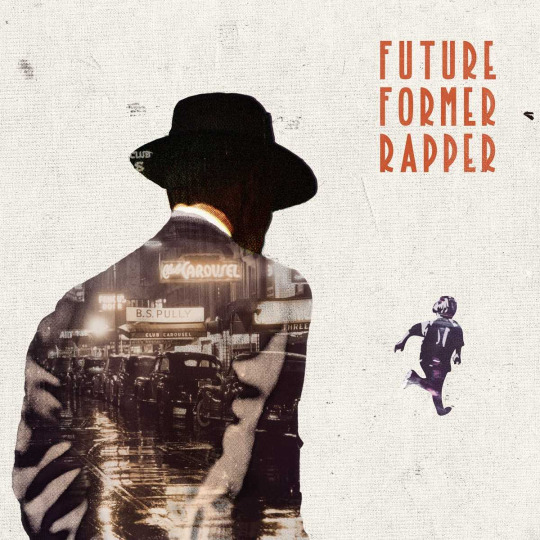
DTN: What about this album was different for you in the approach to bringing it all together? How did you decide on the group of producers you gathered and why them for THIS album?
Zilla Rocca: I really thought this album would be my last. I was about to be a dad and I didn’t think I’d ever have time to work on music again. So I thought about making an album to capture every era from my career. I started in the early 2000’s doing more experimental stuff. Then did boom nap East coast underground music. Then some artsy indie rock sampling stuff. So this album was about showing off all of that.
So choosing the producers to handle that was the key. Steel Tipped Dove is the bridge between the more loop driven east coast beats on here, from Small Pro, Ray West, Disco Vietnam, and Messiah Musik, to the EDM/trap type beats by Starkey and my man William J Sullivan. I probably started the album with his beats and Messiah Musik’s first then chose beats around theirs. I feel like Danny Brown has been really good at that mixture so I patterned it after Old specifically without doing 2 sides to an album that breaks up the style of production. DTN: Jay is 48, Em is 46, El & Killer Mike are 43, do you see yourself actually becoming a Future Former Rapper at some point in time or do you think that it's just going to transition into a different path of creative writing for you, but keep the same essence?
Zilla Rocca: There will be a day when I hang it up. Maybe it’ll be when I’m 40? I’ll be 36 tomorrow but I feel energized now with people still discovering me. But once my son gets old enough to play sports I know my time will be even more limited. And I’ll be ok with that. Like I said I really didn’t think I’d be doing music right now a few years ago. But great writers get better with age so you shouldn’t stop if you can help it.
DTN: What inspires 36yr old you now to keep moving forward and creating? If you could sit 18yr old you down and give him advice about what to expect and how to move what would it be?
Zilla Rocca: I just really do what I like now and I don’t care about what happens after that. If no press gets behind it or If it sells 7 copies I’m ok with that. I’m not as thirsty as I was when I was 18. It’s really just about the work. Since I’ve approached music that way things have gotten easier and I’ve found new fans. I would tell my 18-year-old sell the line I said on “Career Crooks Theme”: nothing comes your way when you chase, best be patient.
DTN: What do you hope Future Former Rapper expresses to the people who take time to sit down and listen to it? What do you want the listeners to walk away with from the experience?
Zilla Rocca: Phonte described his new album in a way that applies to mine: it’s for people who have other shit to do. I was really conscious about the overall running time and number of songs. Selfishly I just want people to hear it and think I’m a great rapper. If they can relate to some of the topics on a personal level, that’s a win too. It’s really autobiographical and very specific to my life growing up loving rap in South Philly in the 80’s and 90’s. But there’s a song about my wife and son and how they became the first thing I loved more than music. So there’s a lot to digest but I wanted to get in and get out like a bank robbery.
DTN: You have Serengeti, Armand Hammer, Curly Castro and another I know I'm missing on the album as guests... What was it about those voices on this album this time around? I know Curly is a regular voice but why Geti and AH...?
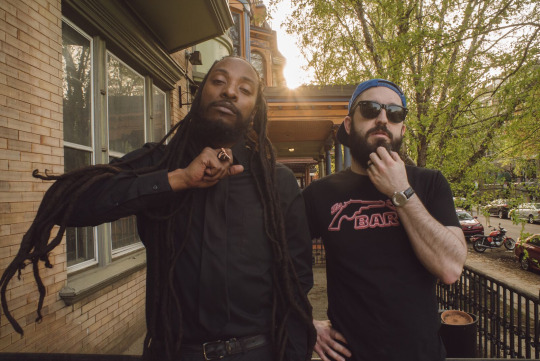
Zilla Rocca: Castro is the most important voice. I deliberately put him on multiple songs because I wanted the album to reflect my life. He’s my best friend and we talk every single day so his voice should be heavily involved. With Armand Hammer, I’ve been working with Elucid since like 2009. It’s great watching people catch up to him now. Billy woods is one of my favorite rap friends ever so even if he didn’t rhyme on the album I would’ve just called him and recorded him talking cause he’s brilliant and hilarious. With Serengeti, I’ve just been a big fan of dude for years and we’ve been twitter homies forever with lots of mutual friends but we’d never worked together. So I wanted him in the mix because he’s very adventurous and bold while being original. Plus he doesn’t do a lot of features so I feel like it’s special getting him on my album.
DTN: Why is storytelling such an important element in your writing? Even with your writing being more straightforward you've always focused on telling stories, and your favorite MCs have all been great storyteller... What is it about bring able to tell a story and not just say fly shit that has no real depth that calls to you?
Zilla Rocca: I think storytelling is hugely important. To me, you’re not a great rapper if you can’t tell a convincing story. I like writing in that form because I’m an avid lifelong reader too. I also like structure and coloring within the lines sometimes and stories make you do that. There’s a beginning, middle, and end. Maybe a cool plot twist. I’ve written a fantasy type of story songs, sports stories, crime stories, relationship stories, and personal stories and I appreciate it when they connect with people. “Time Ran Out” off my new EP “Hard Boiled” is a breakup story and it’s one of the most mentioned favorites which shocked me. I wasn’t sure anyone would like it but I felt like it would break up all the random rhyming and fly talk like you said!
DTN: Favorite rap magazines growing up and why?
Zilla Rocca: Obviously The Source. I also loved Blaze Magazine and then later Scratch Magazine. It was a real elation seeing the newest issues on newsstands cause we had to go hunt and search for hip hop back then. It was a secret.
DTN: You've dropped shit on your own label, you partnered with Urbnet for the Career Crooks albums with Smallpro, and now you've decided to sign with Jeff Weiss' newly formed POW Recordings for your latest solo. Why at this stage of your career when you're capable of navigating it all on your own would you sign with a new label, and what is it about Jeff that had you decide to work with him for this release (other than the obvious fact he's a clear champion of great hip-hop of all kinds)?
Zilla Rocca: I only deal with labels that love the music. I like partnering with people who are excited about the project first and foremost. I just left Toronto where URBnet is located and it’s such a clean and diverse city. Made me realize they really had to love Career Crooks to sign us cause our stuff is gritty and edgy being from Philly, which was not my experience of Toronto at all! With Jeff, we’ve known each other 13 years. I knew of POW Recordings when it was just a thought. His plan was to only sign up and coming cats to help them get shine, not Old grizzled vets like me from the Blog Rap Era on the verge of turning 40 years old. So when he heard the album, he fell in love with it and wanted to be the person who put it out. And I just went with it. It was effortless.
DTN: Thank you for your time my dude, do you want to leave the people with any final thoughts/words?
Zilla Rocca: Check my upcoming album. Check the singles we’ve dropped. Check my latest solo EP “Hard Boiled”, the latest Career Crooks remix album “Thieving as Long as I’m Breathing”, and the Grift Company EP from me and Curly Castro! Psshhew...ok that was a lot. Now, to sign off, peace to everyone who checks my stuff whether you’ve been down since 2008 or 2018. Just you reading this is built off my work ethic and stubborn refusal to quit rapping because I never had a major co-sign or a big manager or was down with a crew that blew up. I just keep doing it year after year so thank you for listening and reading!
Future Former Rapper by Zilla Rocca
0 notes
Photo
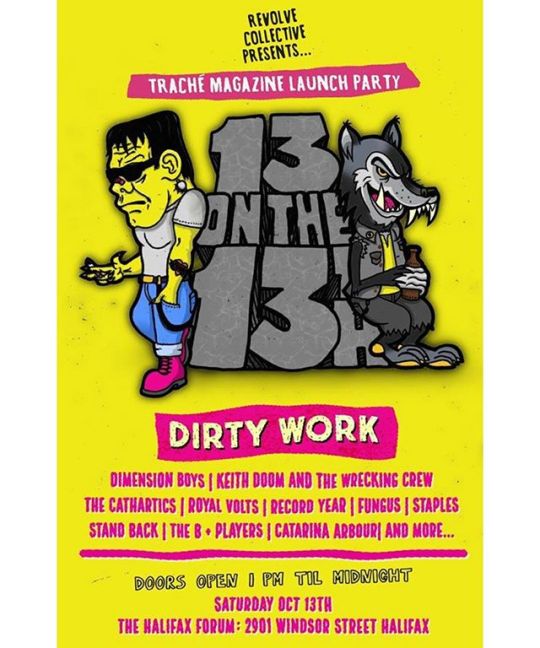
SATURDAY 1pm – midnight / HALIFAX FORUM ⚡️ from @trachemagazine — We welcome you all to come celebrate our magazine launch on October 13 at The Halifax Forum! There we will be giving away free issues of our magazine and spending the day rocking to bands, hanging with awesome vendors and drinking in our beer garden. 🍻 Come get Traché'd! . . 1:45-215pm Roadside Scarecrow . 2:30-3:00 The Good Woods . 3:15-3:45 Stand Back . 4:00-4:30 Catarina Arbour @catarinaarbour . 4:45-5:15 Casual Cries for Help @casualcriesforhelp . 5:30-6:00 The B+ Players . 6:15-6:45 Staples . 7:00-7:30 The Royal Volts @theroyalvolts . 7:45-8:15 The Cathartics @thecathartics . 8:30-9:00 Record Year @record_year_band . 9:15-9:45 Fungus . 9:45-10:15 Dimension Boys @dimensionboys . 10:30-11:30 Dirty Work @dirtyworkofficial . 11:45-12:15 Keith Doom and The Wrecking Crew @kdandthewc . #trachémagazine #trached2018 https://ift.tt/2A78OgV
0 notes
Text
Keith Doom and the Wrecking Crew : Malt Water Party : Space Station 69
Keith Doom and the Wrecking Crew : Malt Water Party : Space Station 69
View On WordPress
0 notes
Text
Keith Doom and the Wrecking Crew : Malt Water Party : Dead Byrdz
Keith Doom and the Wrecking Crew : Malt Water Party : Dead Byrdz
View On WordPress
0 notes
Text
Keith Doom and the Wrecking Crew : Malt Water Party : Burnt Out On Burnouts
Keith Doom and the Wrecking Crew : Malt Water Party : Burnt Out On Burnouts
View On WordPress
0 notes
Text
Keith Doom and the Wrecking Crew : Malt Water Party : Crack Metal
Keith Doom and the Wrecking Crew : Malt Water Party : Crack Metal
View On WordPress
0 notes
Text
Keith Doom and the Wrecking Crew : Malt Water Party : Malt Water Party
Keith Doom and the Wrecking Crew : Malt Water Party : Malt Water Party
View On WordPress
0 notes
Photo

TODAY at GUS' FREE TILL 730 3$ TILL 930 5$ TILL FOREVER . yeppers its another wild one at the family restaurant casino. . THE BAD LADS // BLACK MOOR // ORCHIDS CURSE // OUTTACONTROLLER // MOTHERHOOD (FRED) // KEITH DOOM AND THE WRECKING CREW // GRABOIDS // HITMAN // B + PLAYERS // SORRYS // CATHARTICS // STATE OF ALASKA // OCEAN CHARTER OF VALUES // FRANKLIN BREWERY BOYS . plus green beer, smoking parking lot, and at least 20$ worth of green decorations. . Franklin Brewery Boys FREE from 3-5 http://ift.tt/2nvRKfo
0 notes